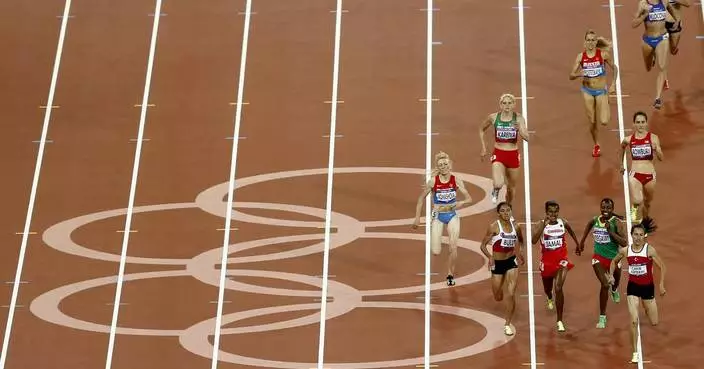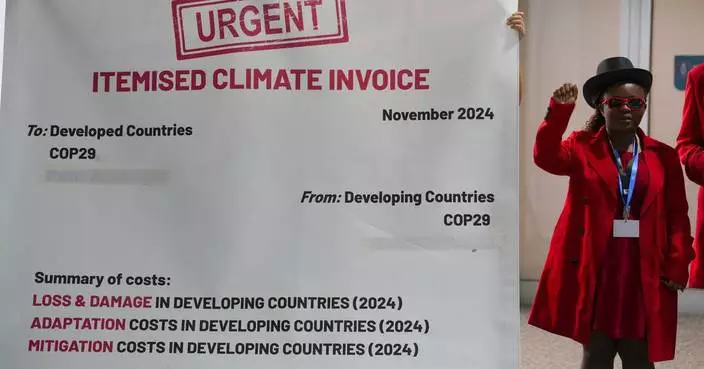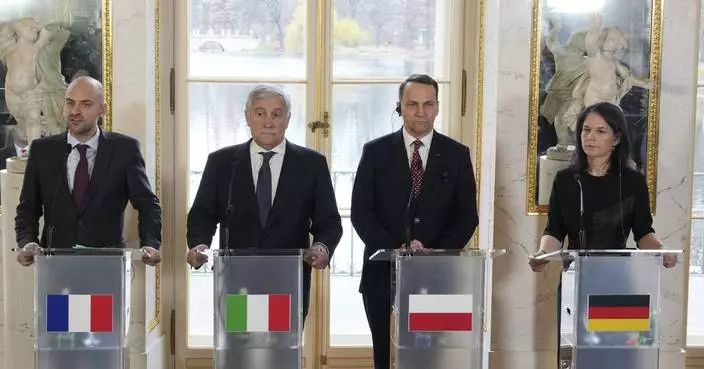COLUMBUS, Ohio--(BUSINESS WIRE)--Nov 19, 2024--
Vertiv (NYSE: VRT), a global provider of critical digital infrastructure and continuity solutions, today announced a significant expansion of its liquid cooling product portfolio with the introduction of two new Vertiv™ CoolChip CDU (coolant distribution unit) systems. These systems enable modular, cost-effective liquid cooling deployments in data centers, making it possible to operate high-density computing for AI alongside traditional air-cooled racks. The new CDUs are on display at the Vertiv booth at SC24, the international conference for high performance computing, networking and storage, from November 19 - 22.
This press release features multimedia. View the full release here: https://www.businesswire.com/news/home/20241119492103/en/
The Vertiv CoolChip CDU family delivers much-needed flexibility to data centers and colocation providers, with capability for fast, modular growth and the ability to support multiple high-density racks from a single CDU, supporting the increasing demand for AI deployments. Along with these new systems, Vertiv has a broad suite of global service offerings to support the deployment of liquid cooled infrastructure, ranging from solution design to installation to on-going lifecycle and fluid management.
“The AI-focused data center necessitates advanced cooling technologies,” said John Niemann, senior vice president of the thermal business unit at Vertiv. “Vertiv's expanded liquid-cooled solutions support the densification of the data center we are seeing as a result of AI. Our liquid cooling portfolio, complemented by our full solution of air cooling, heat rejection, and re-use solutions and global services capability, enables both new and existing data centers to seamlessly introduce liquid cooling as part of the overall hybrid cooling solution to make AI deployments easier, faster and more cost-effective for customers.”
The Vertiv™ CoolChip CDU 2300kW model is a liquid-to-liquid system that offers the most compact footprint in its capacity range, with the smaller cabinet enabling it to be placed in the row or in a mechanical gallery outside of the data center whitespace. Offering 2.3 MW of cooling capacity, this design caters to hyperscalers and colocation providers looking to deploy large scale liquid cooling solutions at the highest density. This solution has the industry’s highest CDU capacity per square foot, enabling operators to reduce cost and footprint by deploying fewer CDUs.
The Vertiv™ CoolChip CDU 350kW model is a liquid-to-air solution that offers direct-to-chip liquid cooling support with air-based heat rejection, enabling it to easily retrofit into existing facilities and to deploy liquid cooling for direct-to-chip applications without a facility chilled water system.
Both Vertiv ™ CoolChip CDU systems can distribute coolant directly to liquid cooled chips and rear-door heat exchangers. Controls allow for fluctuating temperature and flow to match varying application demands. The systems leverage unit-to-unit communication for system-level control; redundant power feeds, pumps and filters for improved cooling availability; remote temperature, humidity and leak detection sensors; and integrated controls that enable remote monitoring and management.
For more information on the thermal management portfolio or other Vertiv solutions for modern data centers, visit Vertiv.com.
About Vertiv
Vertiv (NYSE: VRT) brings together hardware, software, analytics and ongoing services to enable its customers’ vital applications to run continuously, perform optimally and grow with their business needs. Vertiv solves the most important challenges facing today’s data centers, communication networks and commercial and industrial facilities with a portfolio of power, cooling and IT infrastructure solutions and services that extends from the cloud to the edge of the network. Headquartered in Westerville, Ohio, USA, Vertiv does business in more than 130 countries. For more information, and for the latest news and content from Vertiv, visit Vertiv.com.
Forward-Looking Statements
This release contains forward-looking statements within the meaning of the Private Securities Litigation Reform Act of 1995, Section 27 of the Securities Act, and Section 21E of the Securities Exchange Act. These statements are only a prediction. Actual events or results may differ materially from those in the forward-looking statements set forth herein. Readers are referred to Vertiv’s filings with the Securities and Exchange Commission, including its most recent Annual Report on Form 10-K and any subsequent Quarterly Reports on Form 10-Q for a discussion of these and other important risk factors concerning Vertiv and its operations. Vertiv is under no obligation to, and expressly disclaims any obligation to, update or alter its forward-looking statements, whether as a result of new information, future events or otherwise.


VertivTM CoolChip CDU 2300kW liquid-to-liquid and Vertiv™ CoolChip CDU 350kW liquid-to-air coolant distribution units for AI applications. (Photo: Business Wire)
A U.S. envoy has arrived in Beirut to meet with Lebanese officials about a possible cease-fire in the Israel-Hezbollah war.
Amos Hochstein, a senior advisor to United States President Joe Biden, arrived Tuesday, a day after Hezbollah reportedly gave a positive response to a U.S. draft proposal to end the war, which has been ongoing for more than 13 months.
The U.S. has been working on a proposal to end hostilities that would remove Israeli ground forces from Lebanon and push Hezbollah forces away from the Israeli border. More Lebanese troops and U.N. peacekeepers would be sent to the buffer zone in southern Lebanon as part of the deal.
Hochstein’s main meeting on Tuesday will be with Lebanon’s Parliament Speaker Nabih Berri, a Hezbollah ally who is mediating for the militants.
Hochstein’s arrival came hours after an Israeli strike in central Beirut killed five people and wounded others. It was the third Israeli strike in the heart of Beirut in two days.
Since late September, Israel has dramatically escalated its bombardment of Lebanon, vowing to severely weaken Hezbollah and end its rocket barrages into Israel.
Hezbollah began firing rockets, and drawing Israeli retaliation, on Oct. 8, 2023, a day after Hamas’ attack on southern Israel ignited the war in Gaza. Both groups are supported by Iran. The fighting has left more than 3,500 dead in Lebanon and almost 15,000 wounded, according to the Lebanese Health Ministry. It also has displaced nearly 1.2 million, or a quarter of Lebanon’s population.
On the Israeli side, 87 soldiers and 50 civilians, including some foreign laborers who work in agriculture, have been killed by attacks involving rockets, drones and missiles.
Here's the Latest:
JERUSALEM — The Israeli military has facilitated the delivery of blood units to a hospital in isolated northern Gaza.
Israel has imposed a tight siege on the northernmost part of the territory since launching an offensive there in early October. Aid groups say very little humanitarian assistance has been allowed in and have warned of famine.
The military agency in charge of transferring aid to Gaza, COGAT, said it had sent 1,000 units of blood through a northern crossing on Monday. The U.N.’s health cluster said the blood shipment was delivered to Kamal Adwan hospital in Beit Lahiya.
Tens of thousands of Palestinians have fled the northernmost reaches of the strip since the offensive began, and hospitals there have struggled to function.
JERUSALEM — Israeli forces have killed three militants in the occupied West Bank.
The military says they were killed during an ongoing raid in Jenin, in the north of the occupied territory, which has been a flashpoint for Israeli-Palestinian violence in recent years, even before the war in Gaza. Hamas identified all three of those killed as its fighters.
Since Hamas’ Oct. 7, 2023 attack triggered the war in Gaza, Israeli fire has killed at least 784 Palestinians in the West Bank, including 167 children, according to the Palestinian Authority’s Health Ministry.
Most appear to have been militants killed during Israeli raids, but the dead also include people killed during violent protests as well as civilian bystanders.
There has also been a rise in stabbing, shooting and car-ramming attacks against Israelis.
Israel seized the West Bank in the 1967 Mideast war, and the Palestinians want it to form the main part of their future state.
JERUSALEM — Israel has issued a veiled threat to strike Iraq in response to recent attacks by Iran-backed militant groups based there.
In a letter to the United Nations Security Council posted on X, Israeli Foreign Minister Gideon Saar said his country has the right to “take all necessary measures to protect itself and its citizens against the ongoing acts of hostilities by Iranian-backed militias in Iraq.”
Militants in Iraq have launched several rocket and drone attacks against both Israel and U.S. forces since Hamas’ Oct. 7, 2023 attack triggered the war in Gaza.
An Oct. 3 drone attack launched from Iraq on an army base in northern Israel killed two Israeli soldiers and wounded 24, Saar said.
Israel is believed to have struck militants in Iraq in 2019, but it has not acknowledged any such strikes since the start of the war in Gaza. Israel has carried out hundreds of strikes on Iran-backed militants in Syria, Lebanon and Yemen.
In his letter, Saar called on the U.N. to take “immediate action” to address the situation.
BEIRUT — A U.S. envoy to the Middle East says he had “very constructive talks” in Lebanon and that reaching an agreement to end the Israel-Hezbollah war “is now within our grasp.”
“Specifically today, we have continued to significantly narrow the gaps. The meeting was very constructive and very helpful,” Amos Hochstein, the U.S. envoy to Lebanon and Israel, told reporters Tuesday.
He spoke after a two-hour meeting with Lebanon’s Parliament Speaker Nabih Berri, an ally of Hezbollah who is mediating on the group’s behalf.
The emerging agreement would apparently restore a U.N. buffer zone patrolled by international peacekeepers and Lebanese troops in southern Lebanon, with Israel withdrawing its ground forces and Hezbollah militants pulling back to the north.
Hochstein, who has been shuttling back and forth for several months, said he came back to the region because “we have a real opportunity to bring this conflict to an end.”
“I’m here in Beirut to facilitate that decision-making, but it’s ultimately the decisions of the parties to reach a conclusion to this conflict,” he said. “It is now within our grasp.”
Hochstein was scheduled to meet Lebanon’s caretaker Prime Minister Najib Mikati and other officials.
"I am committed to do everything I can to work with the government here in Lebanon and in Israel to bring this conflict to a close,” he said.
GENEVA — The U.N. peacekeeping mission in southern Lebanon, under pressure from an Israeli military campaign against militant group Hezbollah in its area of operations, says Argentina has asked three of its officers in the contingent to return home, while all other contributing countries are maintaining their commitments.
Spokesman Andrea Tenenti of UNIFIL said its “operational capabilities have not changed” after the move by Argentina, and U.N. forces have not moved from their positions – despite Israeli Defense Forces asking them to move from positions near the “blue line” along the Lebanon-Israel border about a month ago.
“The posture of our more than 10,000 peacekeepers from nearly 50 countries remain unchanged,” he told a U.N. briefing in Geneva by video conference from Beirut. The UNIFIL forces have not left the 50 positions across their area of operations, aiming to monitor and report on this situation since Israeli forces began their military campaign in Lebanon in September.
He said UNIFIL has limited means to monitor the situation amid the fighting between Israel and Hezbollah. While Israeli forces have at times moved deeper into Lebanon, it’s not “permanently,” and the level of destruction in UNIFIL zones was “huge” and “shocking.”
Separately, UNICEF spokesman James Elder told the U.N. briefing that more than 200 children have been killed in Lebanon in less than the last two months, saying “their deaths are being met with inertia from those able to stop this violence.”
“It’s become a silent normalization of horror,” Elder said.
DUBAI, United Arab Emirates — Tuesday marks the one-year anniversary of Yemen’s Houthi rebels beginning their attacks on shipping in the Red Sea corridor.
On Nov. 19, 2023, the Houthis seized the car carrier Galaxy Leader in a helicopter-borne attack in the Red Sea. The ship and its 25 crew remain held until today, something the United Nations Security Council noted in a statement calling on the rebels to release the ship and its crew.
The Houthis have attacked over 90 commercial vessels in the time since. They sank two vessels in the campaign, which also killed four sailors. Other missiles and drones have either been intercepted by a U.S.-led coalition in the Red Sea or failed to reach their targets, which have included Western military vessels as well.
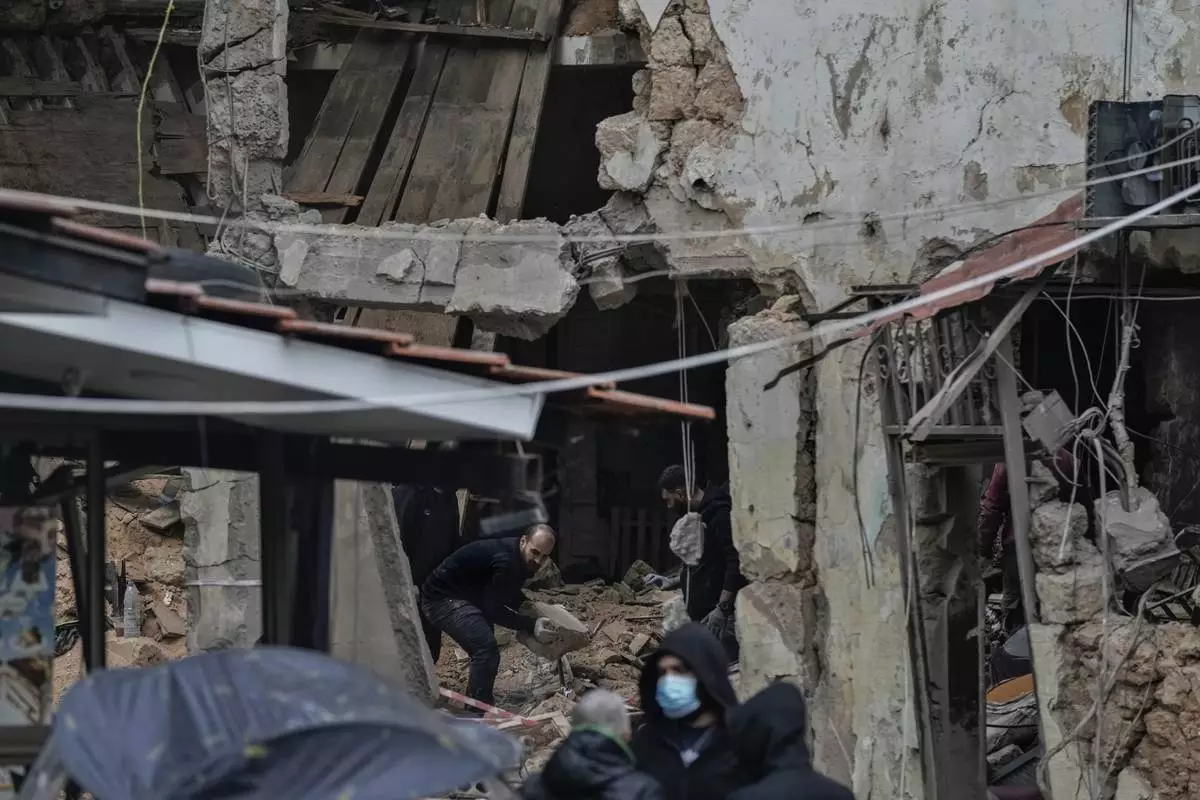
People inspect a destroyed building hit on Monday evening by an Israeli airstrike in central Beirut, Lebanon, Tuesday, Nov. 19, 2024. (AP Photo/Bilal Hussein)
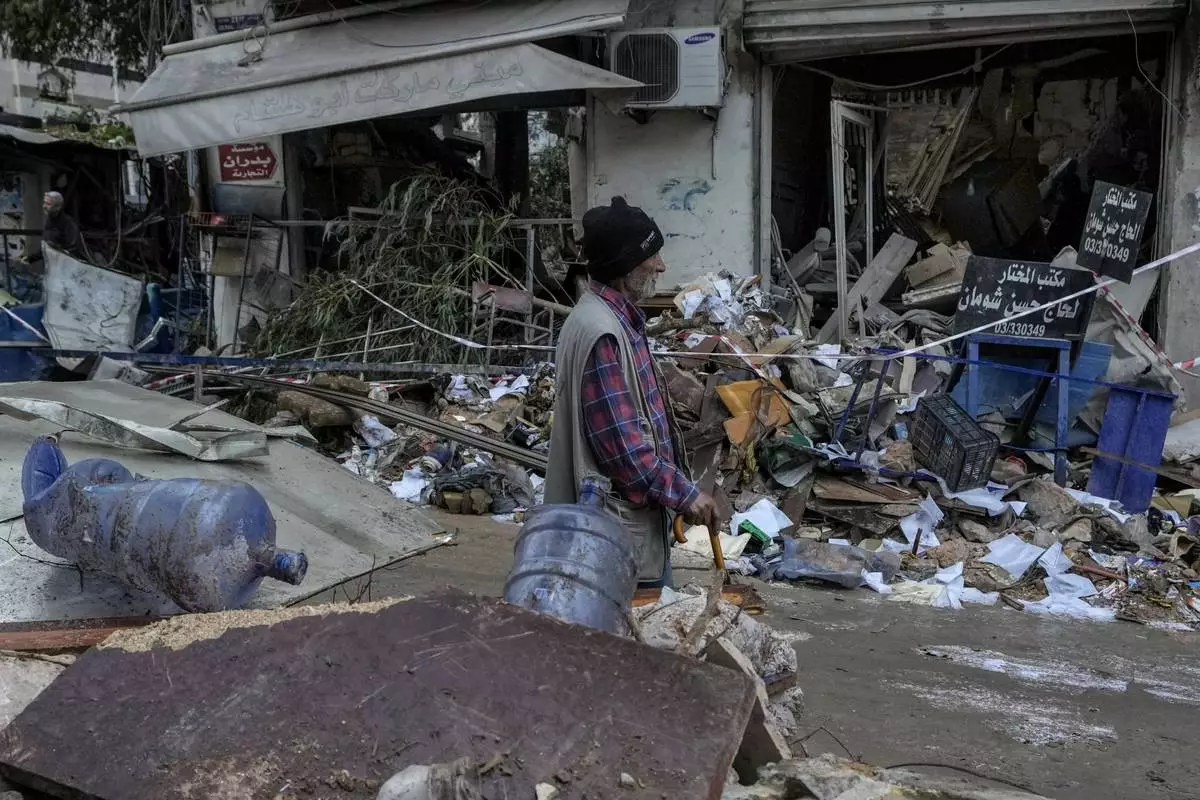
A man passes in front of a destroyed building hit on Monday evening by an Israeli airstrike in central Beirut, Lebanon, Tuesday, Nov. 19, 2024. (AP Photo/Bilal Hussein)
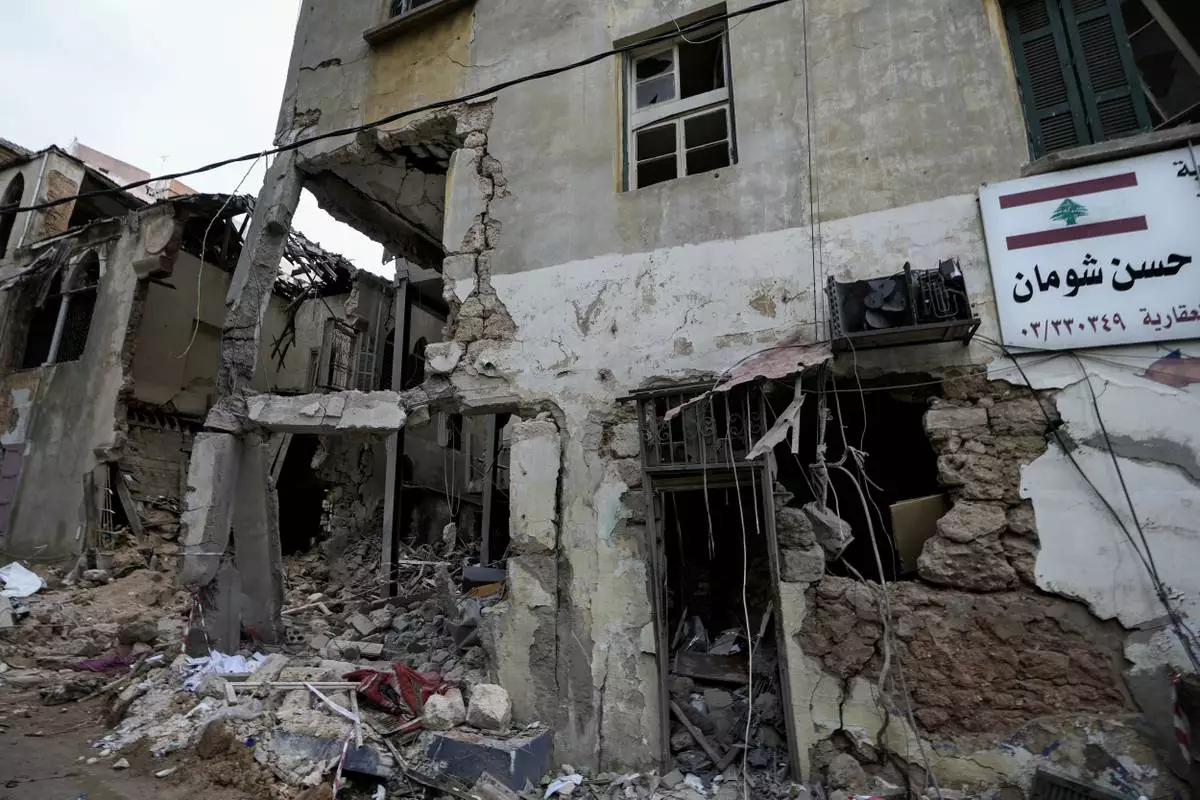
A destroyed building hit on Monday evening by an Israeli airstrike is seen in central Beirut, Lebanon, Tuesday, Nov. 19, 2024. (AP Photo/Bilal Hussein)
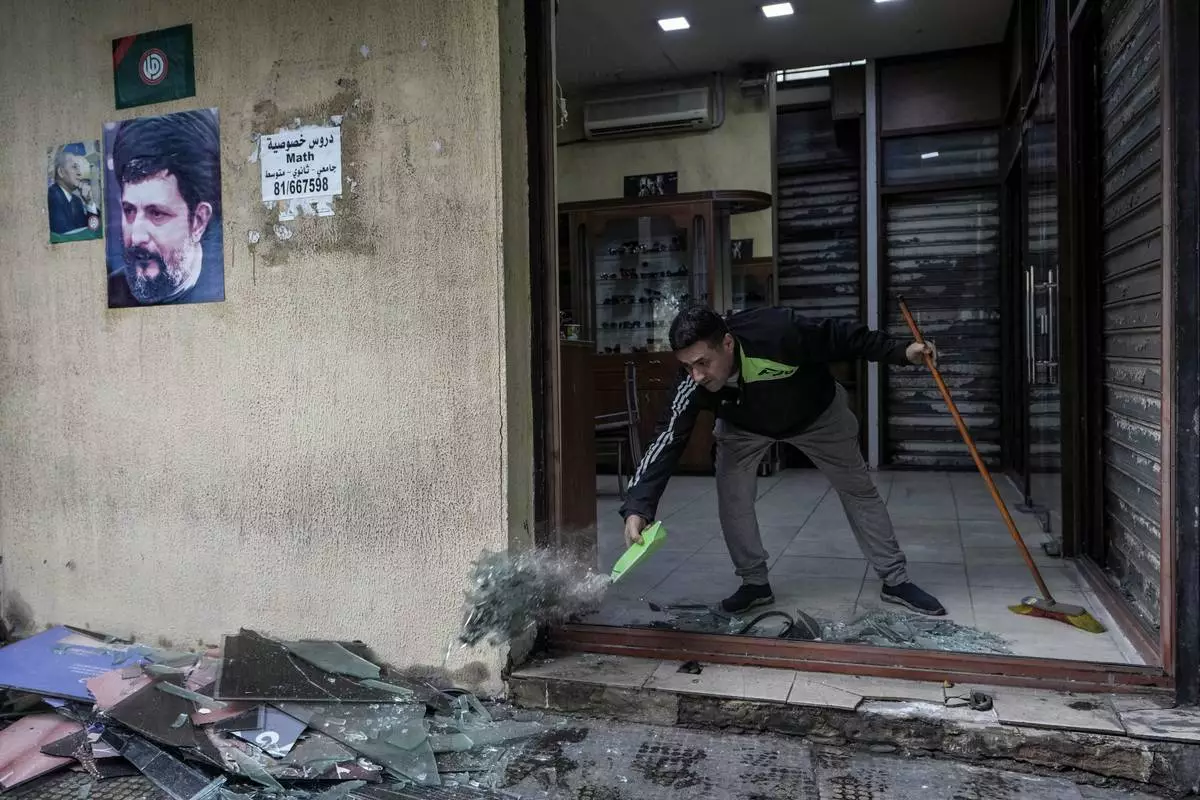
A man clears broken glass from his damaged shop near a building hit on Monday evening by an Israeli airstrike in central Beirut, Lebanon, Tuesday, Nov. 19, 2024. (AP Photo/Bilal Hussein)
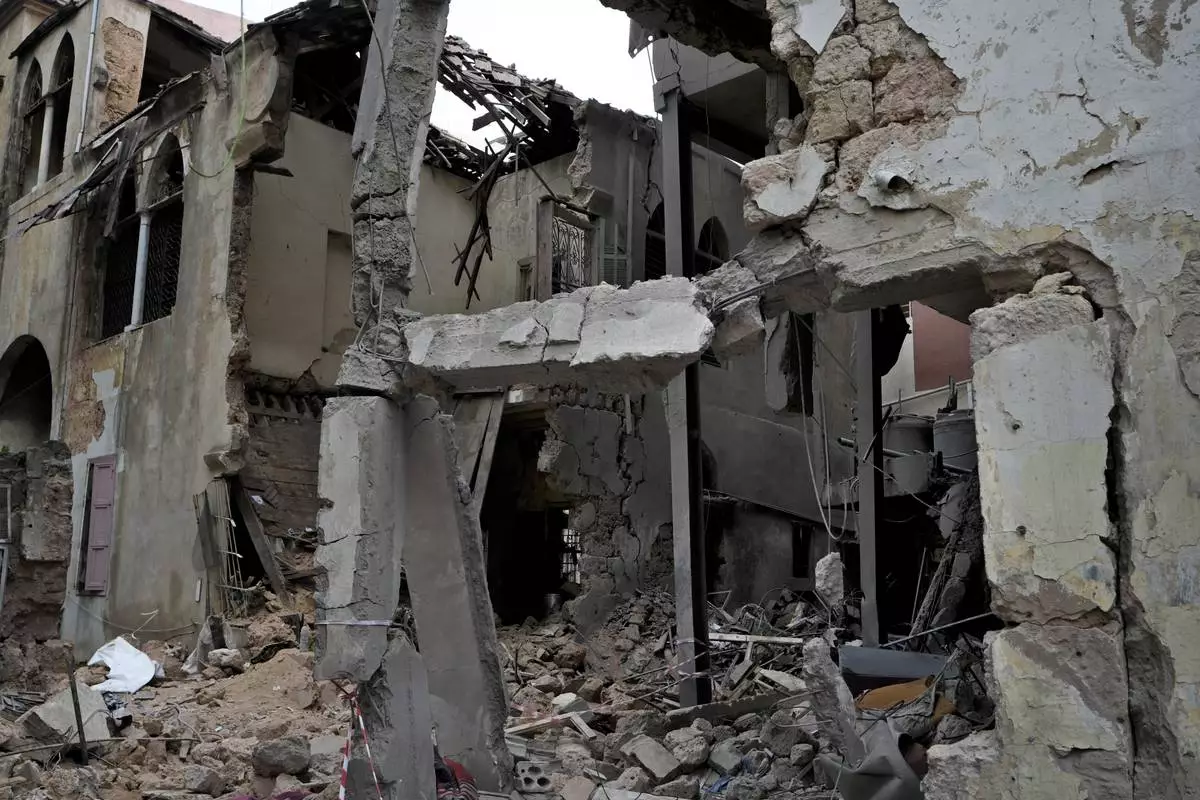
A destroyed building hit on Monday evening by an Israeli airstrike is seen in central Beirut, Lebanon, Tuesday, Nov. 19, 2024. (AP Photo/Bilal Hussein)
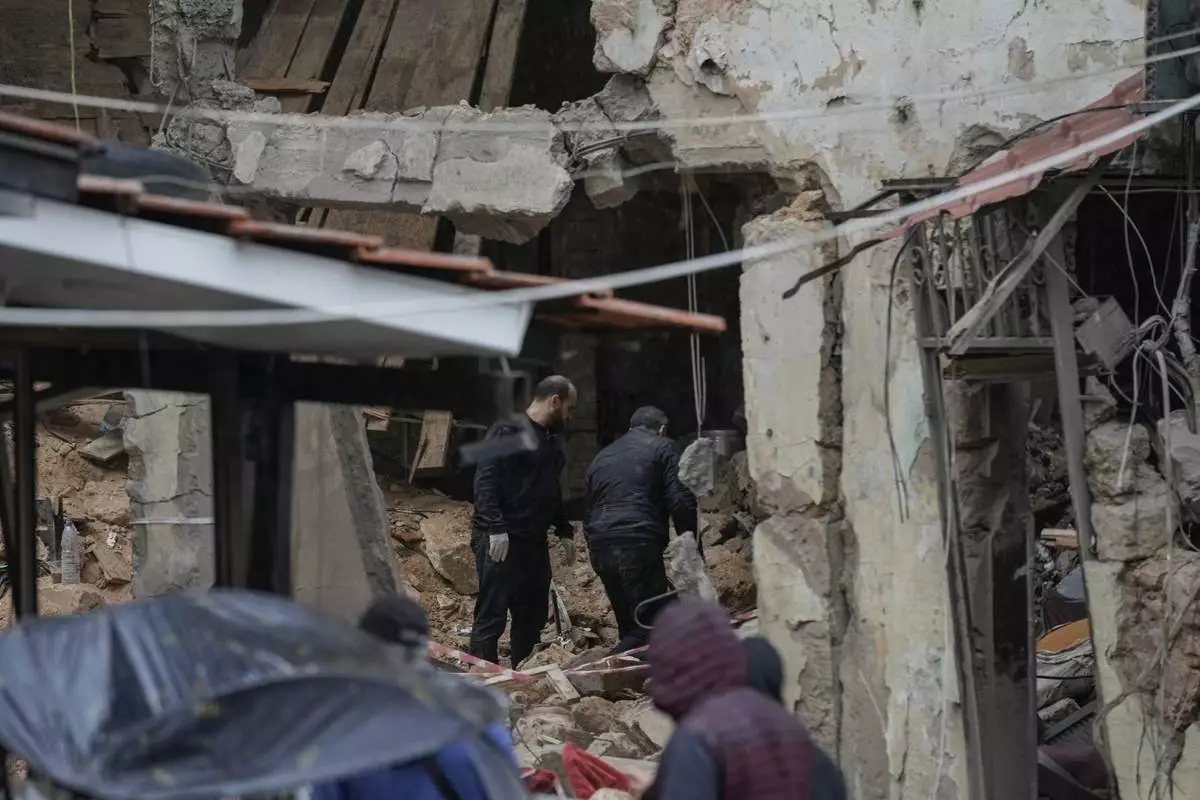
People inspect a destroyed building that was hit on Monday evening by an Israeli airstrike in central Beirut, Lebanon, Tuesday, Nov. 19, 2024. (AP Photo/Bilal Hussein)
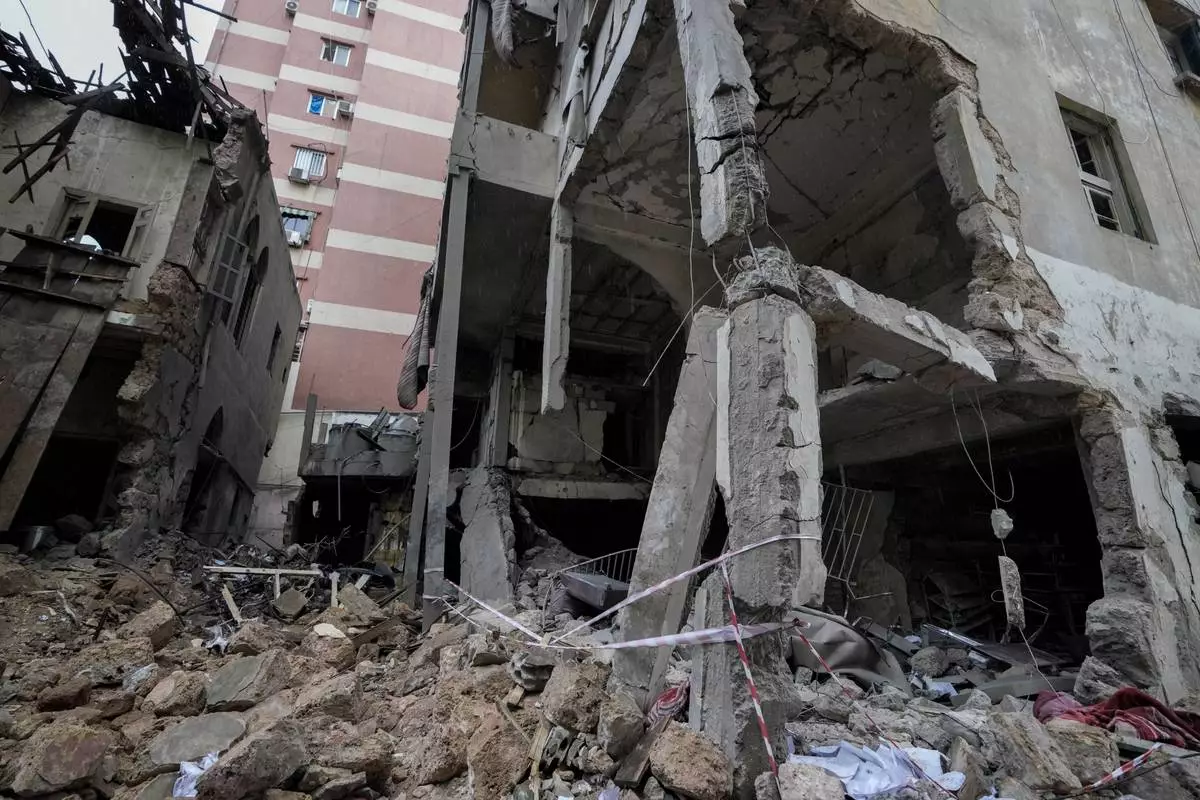
A destroyed building hit on Monday evening by an Israeli airstrike is seen in central Beirut, Lebanon, Tuesday, Nov. 19, 2024. (AP Photo/Bilal Hussein)
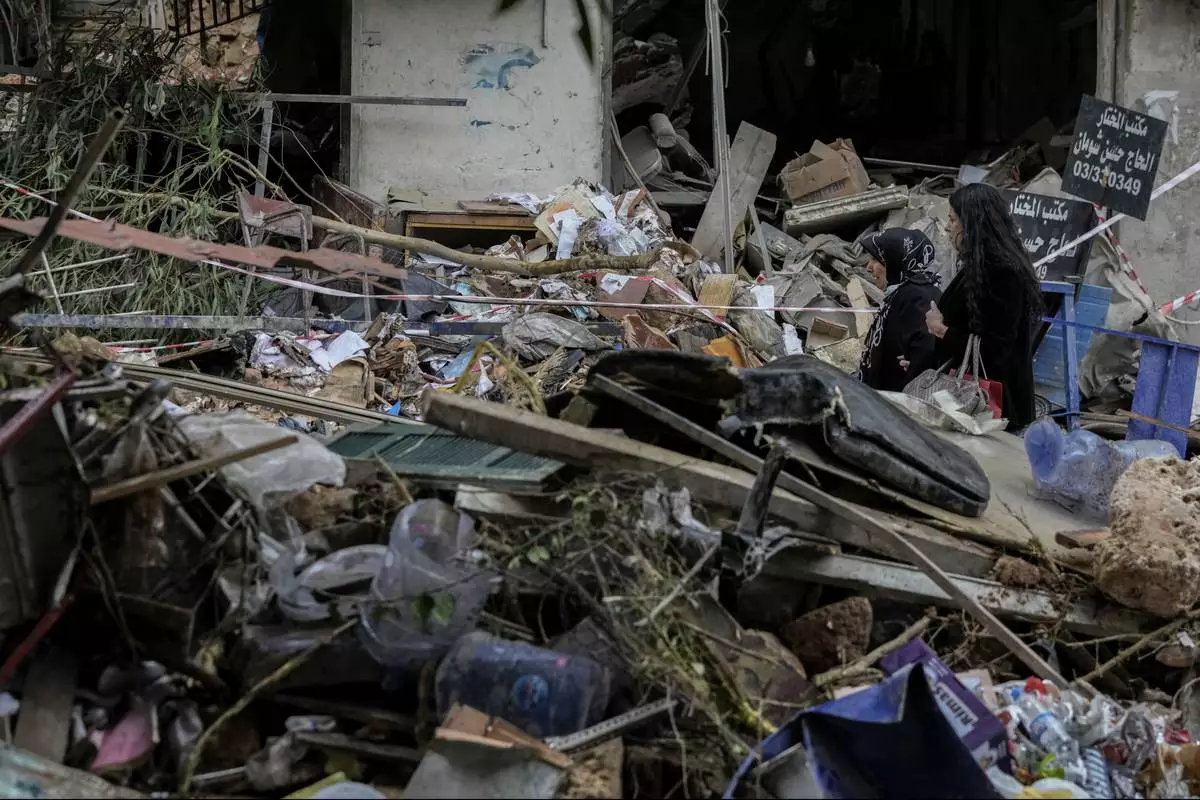
Women react as they pass through debris of a building hit on Monday evening by an Israeli airstrike in central Beirut, Lebanon, Tuesday, Nov. 19, 2024. (AP Photo/Bilal Hussein)
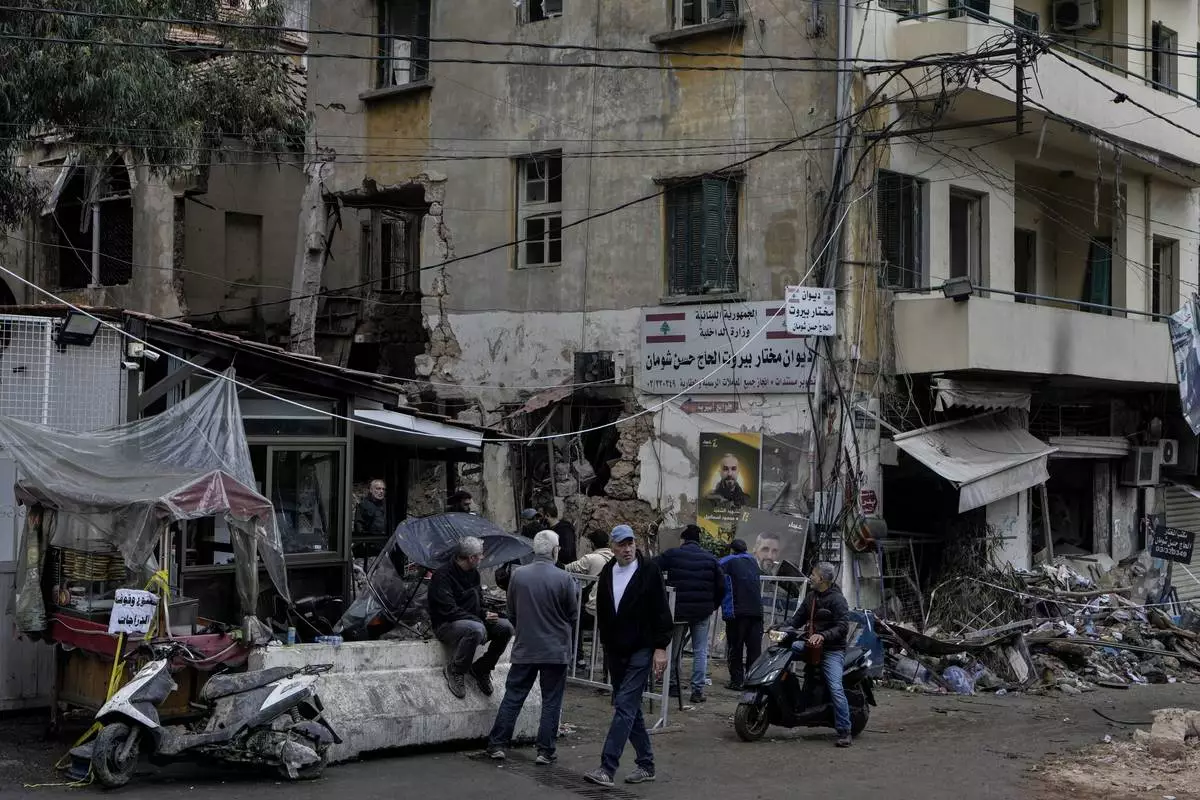
People stand next to a destroyed building hit on Monday evening by an Israeli airstrike in central Beirut, Lebanon, Tuesday, Nov. 19, 2024. (AP Photo/Bilal Hussein)
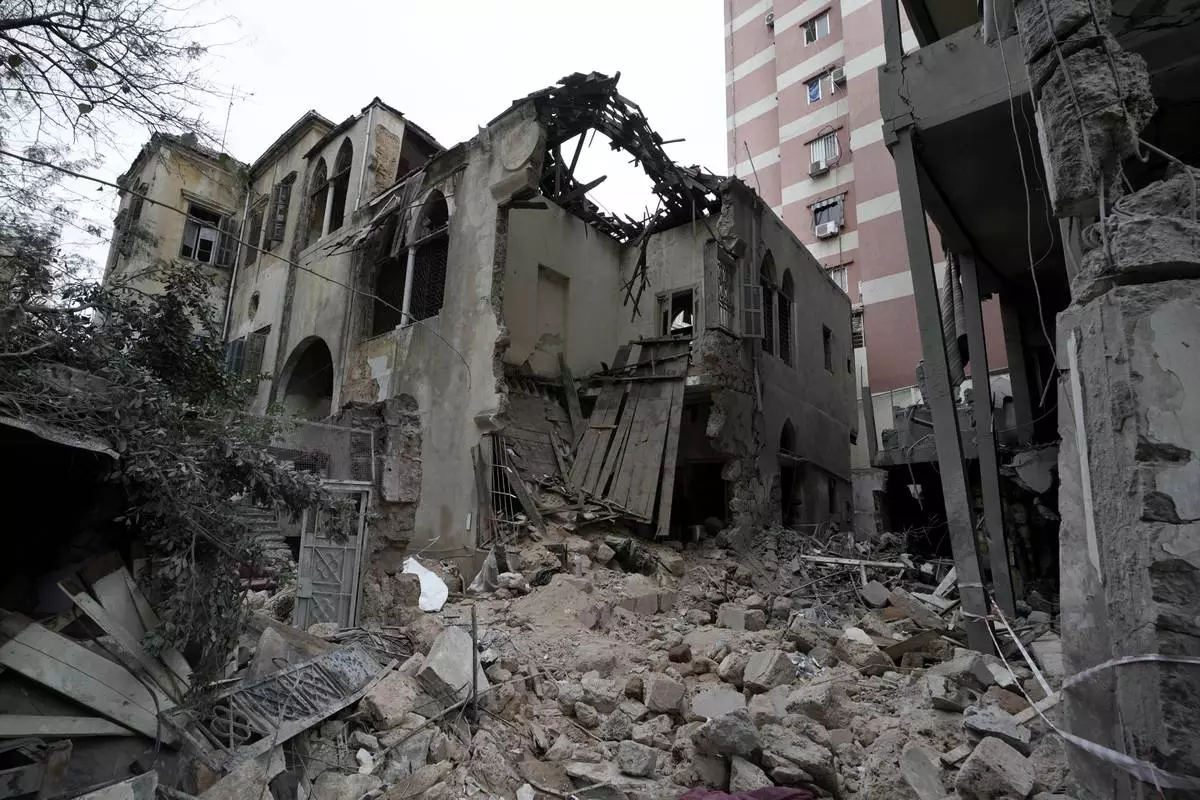
A destroyed building hit on Monday evening by an Israeli airstrike is seen in central Beirut, Lebanon, Tuesday, Nov. 19, 2024. (AP Photo/Bilal Hussein)















